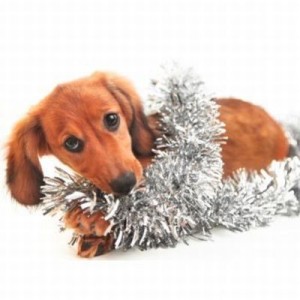As we head into the busy holiday season, it’s good to keep in mind that our pets require careful supervision to keep them safe.
Emergency visits increase for both dogs and cats during this time of year – a reminder that holiday threats can come from a variety of sources, including food, decorations, gift wrapping, and even the comings and goings of friends and family members.
Here are some tips to avoid these hazards during the holidays.
Food-related reminders
 Most people do more cooking and baking this time of year. Here are some important food-related reminders:
Most people do more cooking and baking this time of year. Here are some important food-related reminders:
- Chocolate – especially rich, dark chocolate – can be toxic to dogs. Symptoms range from vomiting and diarrhea to tremors and seizures.
- Ingesting uncooked yeast can cause serious discomfort and possible intestinal rupture in pets.
- Grapes, raisins, and nuts are often found in holiday recipes, and they can pose serious risk to your pets. The ingestion of grapes and raisins, for instance, can cause toxicity that leads to development of kidney failure and lack of urine production.
- The alternative sweetener xylitol can cause acute hypoglycemia, sometimes leading to internal bleeding and liver failure. Xylitol is extracted from corn fiber and other vegetable material and is used as a sugar substitute. Its use has grown in home kitchens, and some pet poison helplines have simultaneously reported increased cases of xylitol toxicity in pets.
- Sharing our delicious ham dinner with our pets can induce vomiting, diarrhea, or even pancreatitis, primarily because of the effects of high fat and salt content.
Dangerous decorations
Holiday decorations and gift wrapping also pose danger:
- Tinsel and holiday ribbon, if ingested, can cause serious intestinal damage.
- Many household plants, such as mistletoe and holly, can cause gastrointestinal upset if ingested.
- Lilies are highly poisonous, and it takes only a small taste of a leaf to kill a cat.
- Tree ornaments can be ingested and lead to blockage of the intestines.
- The water your Christmas tree is sitting in may contain substances from the tree that could make your pets sick.
Guest-related risks
Guests may also inadvertently introduce risks:
- With people coming in and out of your yard and home, doors and gates often are left open – presenting the opportunity for pets to dash out and encounter traffic and other hazards.
- Guests might also have prescription medications that, if left unsecured, could be ingested and cause serious health problems.
- Remember to share with guests that feeding pets “people food” can make animals sick, even if it seems like a nice gesture.
Even with all these potential dangers, the holidays are a wonderful time of year. With a little extra care and supervision, our pets will add to the joys of the season.
Dr. Heather Weir is a veterinarian the Community Practice group at Colorado State University’s James L. Voss Veterinary Teaching Hospital. The team provides general care, wellness services, and treatment of minor injuries and illnesses for pets.